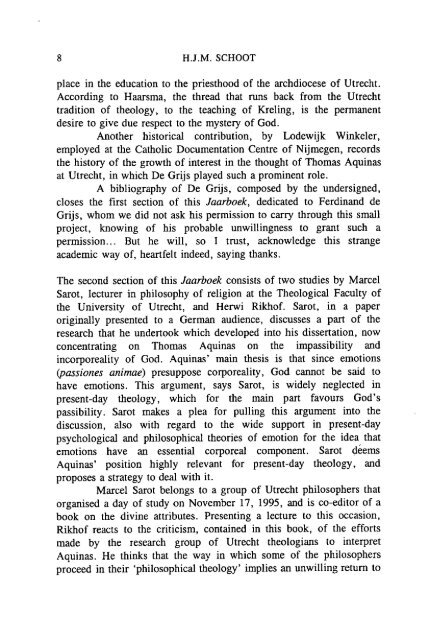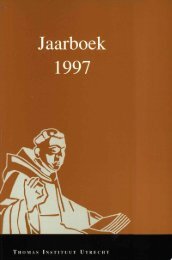Jaarboek Thomas Instituut 1995 - Thomas Instituut te Utrecht
Jaarboek Thomas Instituut 1995 - Thomas Instituut te Utrecht
Jaarboek Thomas Instituut 1995 - Thomas Instituut te Utrecht
You also want an ePaper? Increase the reach of your titles
YUMPU automatically turns print PDFs into web optimized ePapers that Google loves.
8 H.J.M. SCHOOT<br />
place in the education to the priesthood of the archdiocese of <strong>Utrecht</strong>.<br />
According to Haarsma, the thread that runs back from the <strong>Utrecht</strong><br />
tradition of theology, to the <strong>te</strong>aching of Kreling, is the permanent<br />
desire to give due respect to the mys<strong>te</strong>ry of God.<br />
Another historical contribution, by Lodewijk Winkeler,<br />
employed at the Catholic Documentation Centre of Nijmegen, records<br />
the history of the growth of in<strong>te</strong>rest in the thought of <strong>Thomas</strong> Aquinas<br />
at <strong>Utrecht</strong>, in which De Grijs played such a prominent role.<br />
A bibliography of De Grijs, composed by the undersigned,<br />
closes the first section of this <strong>Jaarboek</strong>, dedica<strong>te</strong>d to Ferdinand de<br />
Grijs, whom we did not ask his permission to carry through this small<br />
project, knowing of his probable unwillingness to grant such a<br />
permission... But he will, so I trust, acknowledge this strange<br />
academic way of, heartfelt indeed, saying thanks.<br />
The second section of this <strong>Jaarboek</strong> consists of two studies by Marcel<br />
Sarot, lecturer in philosophy of religion at the Theological Faculty of<br />
the University of <strong>Utrecht</strong>, and Herwi Rikhof. Sarot, in a paper<br />
originally presen<strong>te</strong>d to a German audience, discusses a part of the<br />
research that he undertook which developed into his dissertation, now<br />
concentrating on <strong>Thomas</strong> Aquinas on the impassibility and<br />
incorporeality of God. Aquinas' main thesis is that since emotions<br />
(passiones animae) presuppose corporeality, God cannot be said to<br />
have emotions. This argument, says Sarot, is widely neglec<strong>te</strong>d in<br />
present-day theology, which for the main part favours God's<br />
passibility. Sarot makes a plea for pulling this argument into the<br />
discussion, also with regard to the wide support in present-day<br />
psychological and philosophical theories of emotion for the idea that<br />
emotions have an essential corporeal component. Sarot deerns<br />
Aquinas' position highly relevant for present-day theology, and<br />
proposes a stra<strong>te</strong>gy to deal with it.<br />
Marcel Sarot belongs to a group of <strong>Utrecht</strong> philosophers that<br />
organised a day of study on November 17, <strong>1995</strong>, and is co-editor of a<br />
book on the divine attribu<strong>te</strong>s. Presenting a lecture to this occasion,<br />
Rikhof reacts to the criticism, contained in this book, of the efforts<br />
made by the research group of <strong>Utrecht</strong> theologians to in<strong>te</strong>rpret<br />
Aquinas. He thinks that the way in which some of the philosophers<br />
proceed in their 'philosophical theology' implies an unwilling return to








